With the advent of the 16 days of Activism to End Violence Against Women and Girls (VAWG), we highlight the continued contribution of our scientists and researchers, and their efforts to end this scourge. The SAMRC has been conducting responsive research and designing and testing programmatic solutions to tackle different forms of Gender Based Violence for almost 30 years.
In September, the Gender and Health Research Unit (GHRU) attended the Sexual Violence Research Initiative (SVRI) Forum 2022.
Oral presentations
The SVRI Forum featured several insightful presentations and highlighted some very important challenges and solutions to the violence.
Dr Mercilene Machisa, Specialist Scientist, shared the pilot feasibility study outcomes of a promising sexual violence risk reduction intervention, Ntombi Vimbela! (NV!), designed for first-year female students in higher education institutions in South Africa. NV! participants reported “a reduction in the experience of sexual violence experience, and rape myth acceptance and victim-blaming attitudes” as well as “improved awareness of personal risk for sexual assault, early recognition of sexual assault risk situations or perpetrator behaviours, and ability to implement different strategies to avert sexual harassment and assault”.
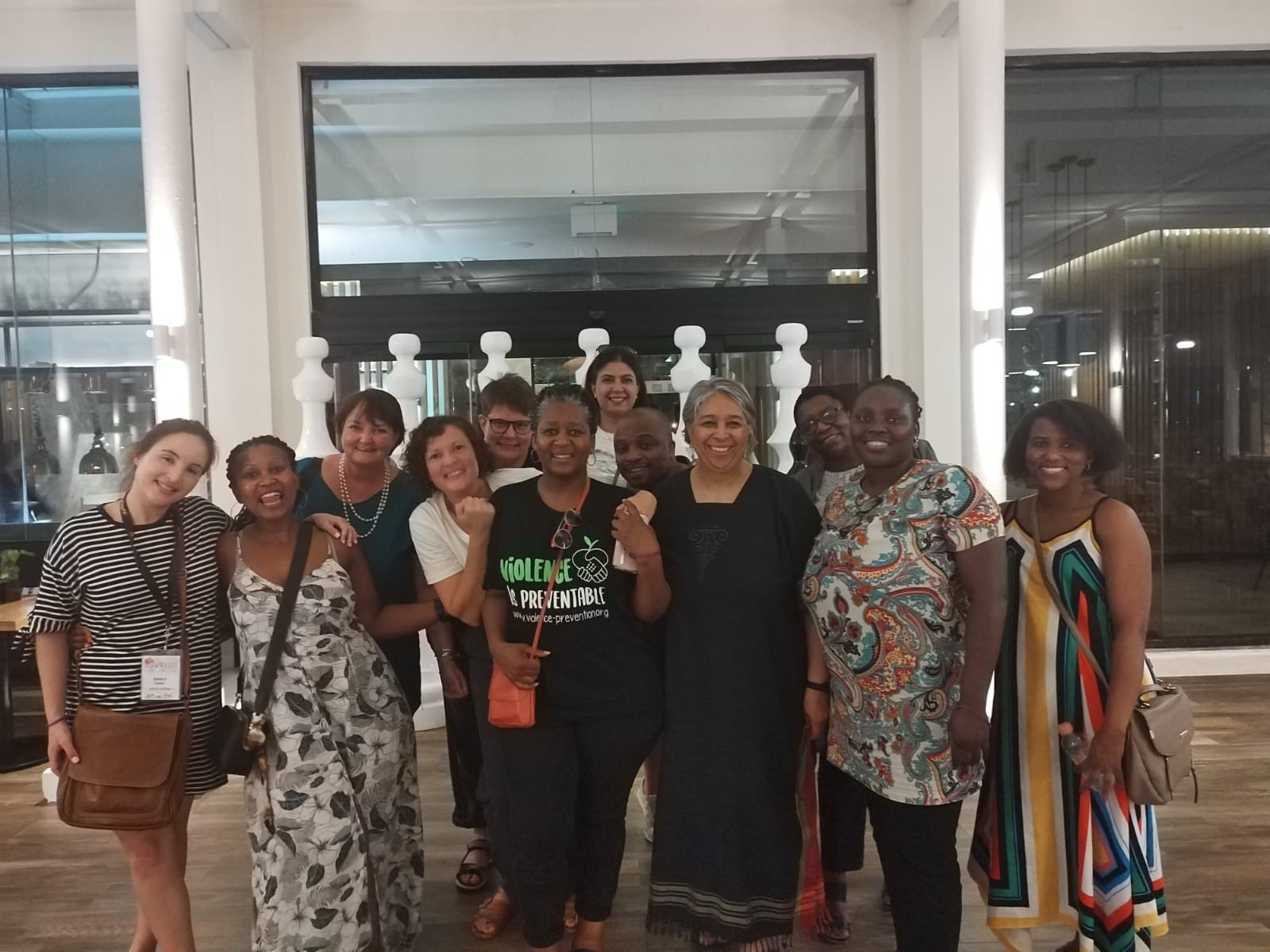
The Gender and Health Research Unit staff attending the SVRI Forum 2022
with long-term collaborators from the University of North Carolina (Dr Abigail Hatcher)
and Project Empower (Sivuyile Khaula)
Dr Leane Ramsoomar-Hariparsaad, Researcher and Research Uptake Specialist, shared on the association between men’s harmful alcohol use and increased risk for both Intimate Partner Violence (IPV) and Non-Partner Sexual Violence (NPSV) perpetration, as well as depressive and Post Traumatic Stress Disorder (PTSD) symptomatology as drivers and outcomes of VAWG. Men who reported harmful alcohol use were more likely to perpetrate violence against women, whether intimate partners or not, while women whose partners were frequently drunk had higher odds of experiencing IPV. Men’s depressive and PTSD symptomatology also increased their risk of perpetrating IPV and NPSV. Women who experienced IPV had increased depressive symptoms and those reporting NPSV had a higher experience of PTSD symptoms.
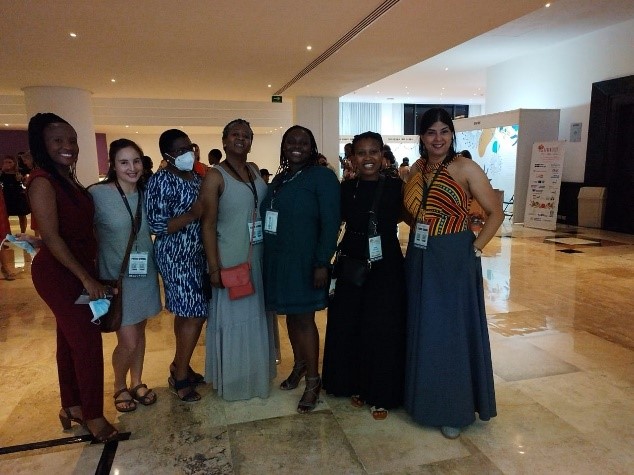
GHRU staff ahead of the closing ceremony of the SVRI Forum 2022
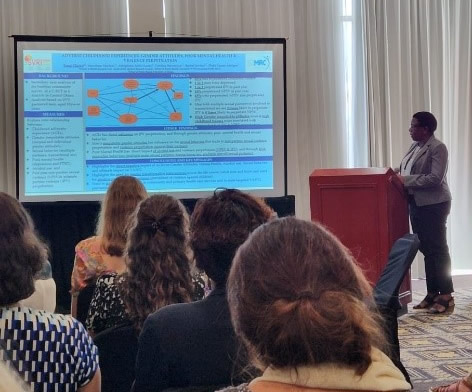 Shibe Mhlongo, Statistician, shared the Rape Impact Cohort Evaluation (RICE) study results on how being raped increases rape survivors’ risk for depression and Post-Traumatic Stress Syndrome in the long term, questioning the effectiveness of current mental health interventions post-rape in South Africa.
Shibe Mhlongo, Statistician, shared the Rape Impact Cohort Evaluation (RICE) study results on how being raped increases rape survivors’ risk for depression and Post-Traumatic Stress Syndrome in the long term, questioning the effectiveness of current mental health interventions post-rape in South Africa.
Dr Esnat Chirwa, Specialist Statistician, indicated that “adverse childhood experiences (ACEs) have direct and indirect impact on men’s use of violence against their partners (IPV) and against non-partners (NPSV) through men’s inequitable gender attitudes, harmful alcohol use, poor mental health and their sexual behavior.” She recommended that “violence prevention programs should be gender transformative and inclusive by engaging men and boys across a life-course in order to address the multiple risk factors.”
Dr Esnat Chirwa: adverse childhood experiences' impact on male violence perpetration
Dr Pinky Mahlangu, Specialist Scientist, contributed on the IPV research methodological challenges and opportunities introduced by COVID-19 pandemic and lockdown. Participant recruitment through social media platforms was adopted, and remote interviewing posed challenges to building rapport hence ensuring privacy and full disclosure of violence exposure by women or perpetration of violence by men were limited. This process “highlighted the need to deepen knowledge on how to improve remote data collection methods and safely conduct remote research to optimize participants’ disclosure of IPV experience and perpetration.
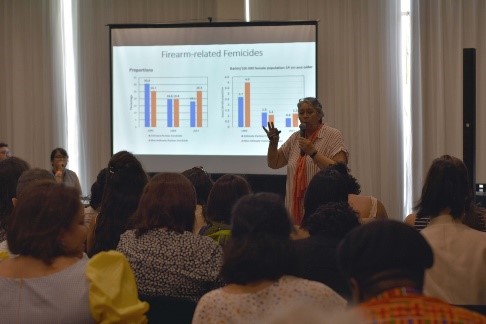 Prof Naeemah Abrahams, GHRU Unit Director, presented the latest femicide research and explained that “women continue to be killed daily by intimate partners in South Africa. Although we saw a decline in femicide rates we need to intensify preventive interventions to save and improve the lives of South African women. Femicide is preventable as shown by our research over 18 years. Having reliable data is critical to continuously understand the extent of femicide in South Africa.”
Prof Naeemah Abrahams, GHRU Unit Director, presented the latest femicide research and explained that “women continue to be killed daily by intimate partners in South Africa. Although we saw a decline in femicide rates we need to intensify preventive interventions to save and improve the lives of South African women. Femicide is preventable as shown by our research over 18 years. Having reliable data is critical to continuously understand the extent of femicide in South Africa.”
Prof Naeemah Abrahams presenting South Africa's Femicide 2017 study results
Poster presentations
Two colleagues presented posters: Dr Bianca Dekel, Senior Scientist, on women’s experiences of mother children in the context of IPV from the research she conducted on shelters, and Asiphe Ketelo, Scientist, shared about the characteristics and social contexts of femicide perpetrators.
Side events: workshops, dialogic panels and participant-driven events
In addition, the Forum had multiple side events which included workshops, dialogues and local and global participant-driven events. This provided the GHRU team with multiple opportunities to engage, discuss new ideas and network.
Prof Abrahams was also recognised and honoured in a plenary session ‘The Researchers on Whose Shoulders We Stand’ for her pioneering work of more than 30 years in the field. She shared her journey on how she forged a career in VAW research. The plenary session was hosted by Prof Rachel Jewkes, Executive Scientist at SAMRC, and the SVRI’s Leadership Council member.
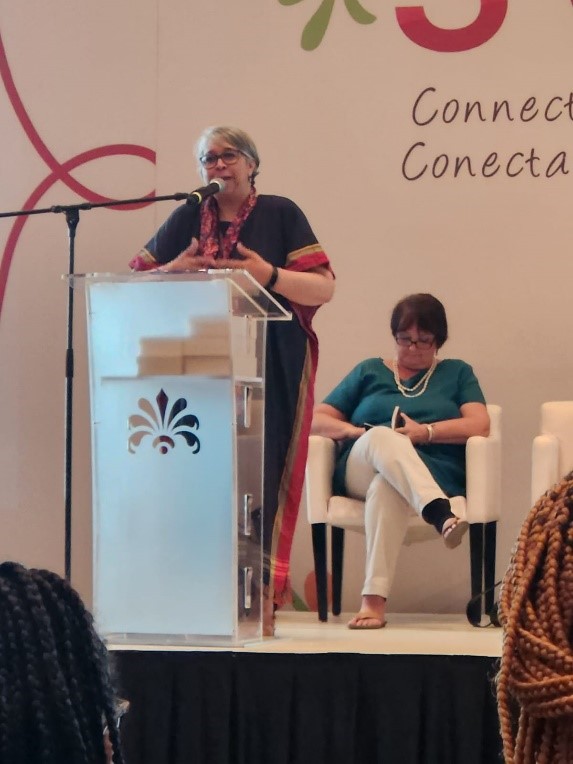
Prof Naeemah Abrahams presenting her VAW career journey
(Prof Rachel Jewkes standing by as plenary panel host)
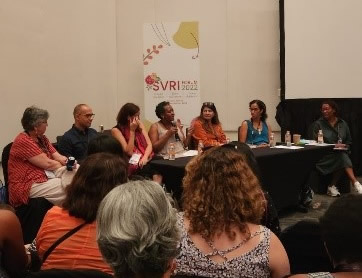 Dr Kristin Dunkle, Chief Specialist Scientist, and Shibe Mhlongo and Dr Chirwa presented a workshop Statistics 101 for VAWG practitioners and qualitative researchers: Understanding and interpreting the numbers (aka “What does all this stats stuff mean & why should I care?”)
Dr Kristin Dunkle, Chief Specialist Scientist, and Shibe Mhlongo and Dr Chirwa presented a workshop Statistics 101 for VAWG practitioners and qualitative researchers: Understanding and interpreting the numbers (aka “What does all this stats stuff mean & why should I care?”)
Dr Nwabisa Shai gave an oral presentation on the on-going research on rape survivors’ emotional wellbeing post-rape and presented a poster regarding her collaborations with Community Based Organisations to promote GBV prevention at the 1st Presidential GBVF Summit of 2018. She was part of a dialogic panel: Power and Control in Research - the HIC and LMIC, discussing the urgency of decolonizing research, and she also facilitated the UNFPA-UNWomen participant-driven discussion on the Essential Package for GBV response in the Eastern and Southern Africa region, working with Dr Dunkle.
Dr Nwabisa Shai speaking at the dialogic panel on decolonisation of research
New research
The GHRU recently released an evidence brief on the second National Study of Child Murder which examined the killing of children in 2017 compared 2009. In so doing, it seeks to address the key question: is there any evidence that the national efforts to combat child abuse and neglect in South Africa are having any impact on deaths of children from abuse and neglect?
Commenting on the brief, Prof Glenda Gray, President and CEO of the SAMRC said “we have found an overall reduction in the number of child murders due to abuse and neglect. However, for as long as one child dies due to this problem, our country cannot rest. Child abuse and neglect, especially the killing of female children is preventable”.

